Jeanne such and such says this….
Ideas & Inspiration
- Online sexual harassment and abuse
- Street harassment & safety
- Salary Negotiation
- Activism
- Highlight Women in History
Things we love
Just Not Sorry – a Gmail Plugin that warns you when you write emails using words which undermine your message- Resource – This is a great article by Inc. Magazine about how to decide which programming language to learn, and it includes a really extensive infographic which lays it all out.
When you are thinking about developing your hackathon team, you might just consider the technical members such as your developers and designers. That would be a mistake. There is more than the formal product that goes into winning a hackathon. Making the product is merely the first step.
Time Management
Hackathons are often done under strict time limits. These are deadlines that you will not be able to extend so it is important to have everything done by the end. Your non-technical teammate will serve as a leader who will coordinate everyone so that you will make sure you are making the progress that you need to make.
Marketing
The product is only worth what you will be able to show it’s worth. An article from Hackernoon references the importance of marketing your product during the hackathon stage. They wrote that one time during their hackathon a product was only in concept stage. However, the team had advertised so much that the audience for their product was clearly there. That team ended up winning.
Communication
Another avenue to consider when it comes to forming your team is the final presentation. The difference between a good and bad presentation can be the deciding factor for your success or failure. Imagine if an essential feature of what you produced in the hackathon was left out of your presentation. This would lead to confusion about what your product is capable of. Zoheb Davar recounted a blog for Medium of his hackathon success that was partly due to his ability to present his team’s product.
Blog, Hackathon Info
Thanks to two fantastic photographers (Christine & Genesis) we were able to get a ton of action shots throughout the weekend plus some excellent team portraits at the end!Blog, Diversity & Inclusion
WATCH IT, WEINSTEIN: WOMEN HACK HARASSMENT AND SEXISM IN TECH
Women and non-binary hackers tackle harassment, equal pay, hygiene and homelessness
San Jose, CA: Hackers turned activism into action this past weekend at a new hackathon for women and non-binary folks. With only a weekend to build their projects, the teams in the inaugural Hack The Patriarchy hackathon went after some of the biggest problems facing women and marginalized communities – sexual harassment and abuse, workplace equality and HR, finding positive news in an aggressive media landscape, women’s health and hygiene, and helping the homeless.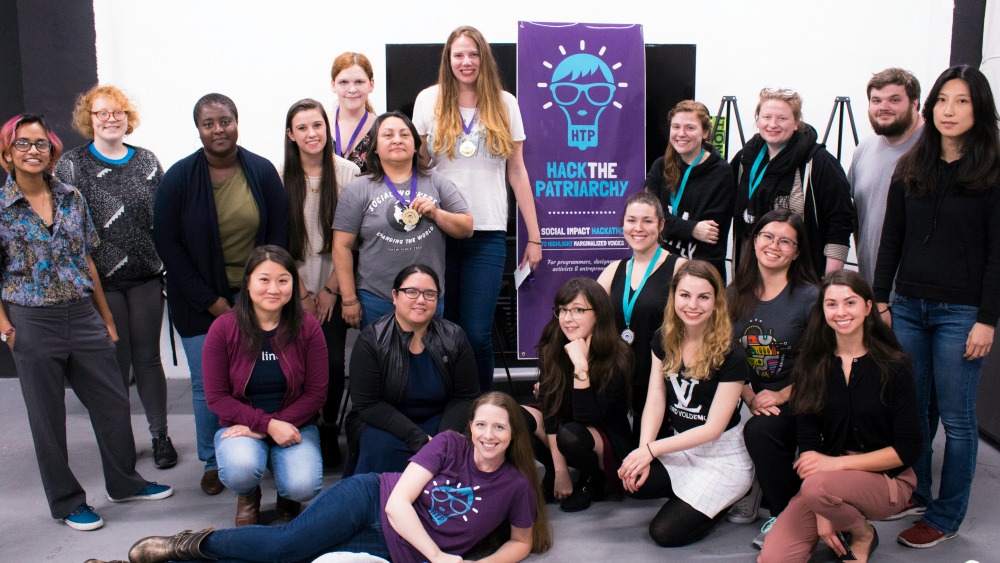
The free hackathon received more than 110 applications and accepted 82 registrations. 58 people attended over the course of the weekend. Five teams with 23 team members made it through to the final presentations. The Grand Prize was won by Tusker App, which uses AI to identify and flag verbal abuse, discrimination, or harassment. The People’s Choice Prize was won by Help. (“Help Period”), a peer-to-peer app that helps women — including homeless women — who need tampons or pads in an emergency.
Julie Ramirez from the County of Santa Clara Office of Women’s Policy says, “It’s exciting to see so many women working on apps that have a direct positive impact on the lives of other women in need. What drives their work is the overwhelming desire to help others. Hack The Patriarchy creates a safe space for women and gender non-conforming individuals to bring their tech skills together to improve our community. The Office of Women’s Policy is proud to partner on this endeavor.”
Diana Solatan from Women Who Code worked with teams as a mentor during the hackathon. She says that there is less of a corporate feel to this event than most hackathons. “Everyone was focused on solving a real social issue. At other hackathons, you can see that people have their own agendas, whether it be to win a prize, to get a job, to find a co-founder, but here, everyone’s agenda was to make the world a more inclusive place.”
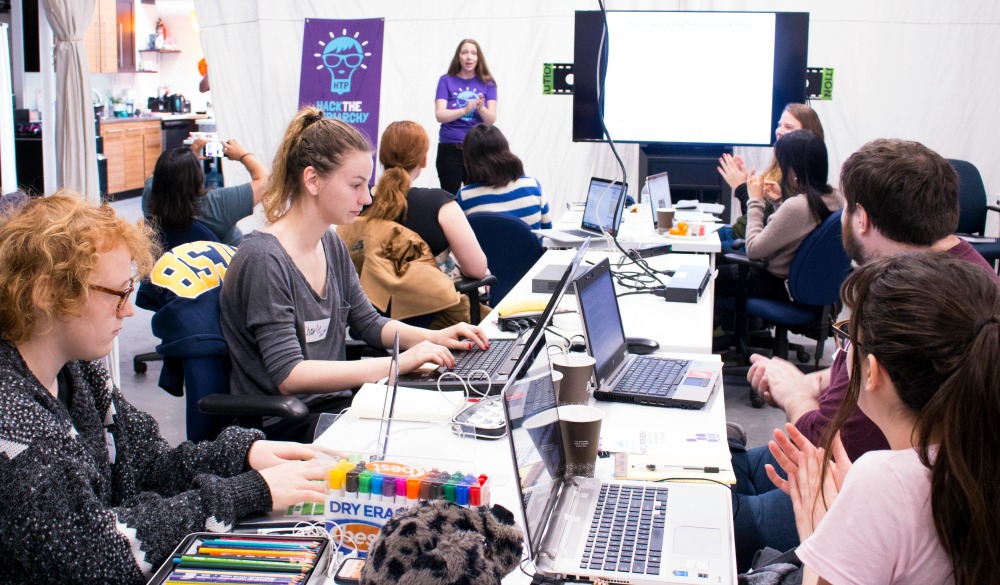
Eva Helén, CEO of Epiquette and one of the competition judges, also noticed the different vibe. “The atmosphere and energy in the room was focused and full of anticipation. Kali had encouraged the ideas to flow and the teams were working hard on projects that could solve ‘real world’ challenges. I was impressed by their creativity and their ambition to make a difference.”
According to Kali Williams, founder of the event, “We wanted to provide a safe and supportive environment where the attendees could work on problems that matter to them without the negative distractions you typically get as a woman at a hackathon. The response we’ve had from the hackers here is a resounding ‘yes, please.’The inspiring products built this weekend demonstrate that women and non-binary hackers are more empowered than ever to create amazing things when they have a room of their own.”
Williams felt that a women-focused event was needed after competing in hackathons that did not feel friendly to women. “It’s not enough to get rid of the Nip Alerts, the beer pong, and the coder odor. Hackathons are still heavily male-centric, with unhealthy food and uncomfortable environments, and they’re stressful and aggressively competitive. We plan to do mixed gender events with allies welcome in future as well.”
The hackathon was held at the ActionSpot co-working space and incubator in San Jose. Teams competed for a prize pool worth more than $4000, including a $500 cash grand prize, Amazon Echo Dots and gift cards, a membership to ActionSpot, and the chance to pitch to investors and join the incubator program.
“We all talk about diversity,” says ActionSpot’s co-founder and CEO, Olga Buchonina, “but this hackathon acts on it. It’s focused on doing social good and impacting lives, and moving from words to actions. I love it when we use our professional skills and create true impact.”
The hackathon attracted strong support for a first-time community event. In addition to ActionSpot, the event was also supported by sponsors Yelp, Slack, Balsamiq, and NumFocus, with swag donated by Linode and Built.io. “I didn’t think we’d be able to attract commercial support as a first-time women-focused tech event,” says Williams, “but it is a testament to the commitment of these companies to diversity and supporting women and non-gender conforming folks that they got on board when this was just an idea.”
Workshops and panels were held in the weeks leading up to the event, rather than during the hackathon itself, to reduce stress, give participants more time to focus during the hack, and provide an opportunity to meet potential teammates:
- Data Science workshop held in partnership with NumFocus at the University of San Francisco Data Institute
- API Workshop run by Bear Douglas, the Developer Advocacy Lead at Slack, who was previously at Twitter and Facebook
- Founder Mixer Panel: featuring Guadalupe Rodriguez from Planned Parenthood; Carla Collins from Santa Clara County Office of Women’s Policy; Kelly Jenkins-Pultz from the San Francisco Women’s Bureau; Ruth Silver Taube from the Santa Clara University School of Law; and Aly Sheppard from Caminar, a mental health non-profit
The winning projects are:
- Tusker App: an App that listens to conversations for “the elephant in the room” and uses AI to identify and flag verbal abuse, discrimination, or harassment, using sentiment analysis and natural language processing (Grand Prize Winner).
- Help. (“Help Period”): a peer-to-peer app that provides a platform for empowering women to help other women in their times (of the month) of need. The App is designed to help women who need tampons or pads in an emergency, and to facilitate donations of hygiene and sanitary products to homeless women’s shelters (People’s Choice Award).
- Choose Your Win: an interactive game to navigate issues that women face in the workplace and when job seeking, such as negotiating equal pay. Users user can play the game and navigate the recruitment and hiring process through their character (Most Original).
- Athena: Your confidant in the workplace – an AI chatbot that collects experiences and provides training for appropriate behavior and reactions. It helps employees dealing with harassment and other issues to find information and coaching, and to navigate HR workplace processes (Best Chat Bot).
- The Daily Reach: a news aggregator that features the accomplishments of women, trans, and non-binary people. In a world of negative news, this aggregator seeks out positive stories for marginalized communities (Most Positive Impact).
About Us: Hack the Patriarchy is a social impact hackathon where women and non-binary folks hack together in a safe and supportive environment to build projects that improve life for women and marginalized communities. Participants come from diverse backgrounds, ranging from first-timers to seasoned hackers, and form teams that include developers, designers, activists, marketers, and entrepreneurs. Teams have a weekend to build an initial product or prototype, and are supported with mentoring, resources, pre-event workshops, and training. Hack The Patriarchy is a mission-driven, not-for-profit community event founded to empower women and allies to take action and fix problems by hacking on solutions together.
Thank you to all of our sponsors: ActionSpot, Yelp, Slack, Balasamiq and NumFocus
Blog, Community
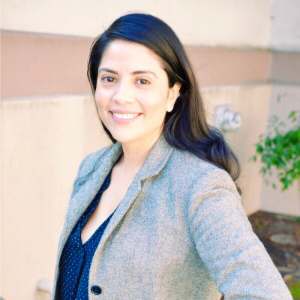 Guadalupe Rodríguez
Guadalupe Rodríguez
Guadalupe Rodríguez is the Director of Public Affairs at both Planned Parenthood Mar Monte, the largest Planned Parenthood affiliate in the country, and Planned Parenthood Advocates Mar Monte. Previously, Lupe was the Program and Policy Director and interim Executive Director at ACCESS Women’s Health Justice.
Lupe served on the board of directors of Essential Access Health (formerly the California Family Health Council), and now chairs the board of ACCESS Women’s Health Justice. She is also the treasurer of the board of California Latinas for Reproductive Justice. She is serving her fifth year on the Santa Clara County Commission on the Status of Women, after serving four years as the Chair. She was recently elected to the board of the Silicon Valley Chapter of Democratic Activists for Women Now (DAWN) and the Community Advisory Board for the Center for Clinical Research at Stanford University.
In 2010, Lupe was honored with the ‘Generation Award for an Emerging Leader’ from the California Coalition for Reproductive Freedom, and she received the “40 Under 40” Health Care Leaders award by Silicon Valley Latino magazine in 2013. She has a BA in neurobiology from Harvard University.
 Carla Collins
Carla Collins
Since April 2017 Carla Collins has served as the Interim Director for the SCC Office of Women’s Policy. In this role, she oversees a $1.7 million-dollar budget and with a team five provides staff support to four county commissions and two task forces while implementing strategies to ensure that our local government is bringing a gender lens to policy and decision making, building the pipeline for women and girls leadership, and demanding equity.
Attention now is focused on 2018 – not just because of mid-term elections but also the 20th anniversary of the Office of Women’s Policy. To commemorate the past as we plan the future OWP is planning informational and inspiring events throughout the year and hopes to engage more community in policy briefings and trainings, launch the State of Women and Girls 2018 and host a County Women’s Caucus to inform our Public Policy Agenda. We encourage residents to sign up for our newsletter and Like us on Facebook!
A San Jose native, Carla’s long-standing commitment to community and work to advance women fuels her passion to continuously engage individuals and groups in the democratic process.
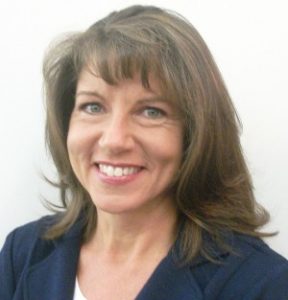 Kelly Jenkins-Pultz
Kelly Jenkins-Pultz
Kelly Jenkins-Pultz is the Regional Administrator for the San Francisco Women’s Bureau office which serves the states of Arizona, California, Hawaii and Nevada. She creates and delivers educational programs to advance women’s wages, job opportunities and benefits; and provides technical assistance to educators, business and community leaders about policies and programs to enhance women’s economic status.
Kelly has expertise in the areas of equal pay, nontraditional jobs, workplace flexibility and working mothers. She was the Women’s Bureau’s lead writer for the report, Fifty Years after the Equal Pay Act: Assessing the Past, Taking Stock of the Future, issued by the National Equal Pay Task Force. In the area of nontraditional jobs, she has initiated several interagency working groups on tradeswomen that are actively promoting new opportunities for women in apprenticeship and the trades throughout the region. She is an active member of the San Diego Expanding Your Horizons Committee to promote career opportunities for women in the fields of science, technology, engineering and mathematics. She also provides training to lead employers in the creation of healthy workplaces for working mothers and greater workplace flexibility for everyone.
Prior to joining the Women’s Bureau, Kelly worked with nonprofit organizations and with elected officials at the municipal, state and federal levels of government. She holds a Master’s Degree in Public Policy and Women’s Studies from the George Washington University, and a Bachelor’s Degree in English from St. Mary’s College of Maryland.
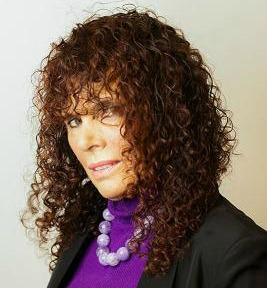 Ruth Silver Taube
Ruth Silver Taube
Ruth Silver Taube is the Supervising Attorney of the Worker’s Rights Clinic at the Katharine & George Alexander Community Law Center at Santa Clara University School of Law, Special Counsel to Legal Aid at Work, and an Adjunct Professor at Santa Clara University School of Law.
She collaborates with the Vietnamese American Bar Association of Northern California and the Filipino Bar Association to conduct legal clinics for monolingual Vietnamese American and Filipino clients and to screen for human trafficking. She is Legal Services Chair of the South Bay Coalition to End Human Trafficking, a member of the South Bay Coalition’s Executive Board, an alternate delegate to the Santa Clara County’s Human Trafficking Commission, Coordinator of the Santa Clara County Wage Theft Coalition, and a founding member of the Bay Area Equal Pay Collaborative
After law school, Ms. Silver Taube served as a law clerk for the Honorable Ronald M. Whyte, District Court Judge for the Northern District of California, as a Federal Mediator at the EEOC, a panel mediator at the United States Department of Justice, Civil Rights Division, and a partner at the Law Office of Silver and Taube where she specialized in employment law and benefits. Before law school, she was a journeywoman machinist, President of IAM Local 547, and a Field Representative for SEIU Local 535. She also taught at Njala University College in Sierra Leone with the Canadian Peace Corps.
She received the Unsung Hero Award from the Santa Clara County Victim Support Network in 2013 for her workers’ rights and human trafficking work. She was the keynote speaker at the Vietnamese American Bar Association’s dinner in 2013 and received a Certificate of Special Congressional Recognition from Congresswoman Anna Eshoo for her efforts to provide legal services to the Vietnamese American community. In 2016, she received the Pro Bono Recognition Award from the Santa Clara County Bar Association.
She is a graduate of the University of Michigan (B.A. with high distinction, Phi Beta Kappa); the University of California at Berkeley (M.A.); and Santa Clara University School of Law (summa cum laude).
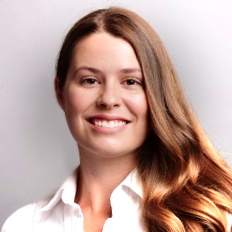 Aly Sheppard
Aly Sheppard
Aly Sheppard brings an analytical mindset to sales and marketing in the biotech and mental health sectors.
From pharmaceutical sales to program modeling, Aly uses her experience in experimental design to trouble-shoot and find data-driven solutions. Aly currently works as a Grants Coordinator at Caminar, a mental health nonprofit. Her priorities include analyzing and communicating the impact of Caminar’s programs while growing the nonprofit’s grant portfolio.
Aly holds a Bachelor of Science in Biochemistry from the Georgia Institute of Technology, and she is always looking for new ways to learn.
Moderator – Kali Williams, Founder of Hack the Patriarchy Kali created Hack the Patriarchy after attending a few hackathons and seeing that there is still a pretty low presence of women. As a feminist and a long time advocate for women, she saw a possibility to create a space that put women and underrepresented folks at the forefront of tech while focusing on projects that can make tremendous real world social impact.
Kali created Hack the Patriarchy after attending a few hackathons and seeing that there is still a pretty low presence of women. As a feminist and a long time advocate for women, she saw a possibility to create a space that put women and underrepresented folks at the forefront of tech while focusing on projects that can make tremendous real world social impact.

